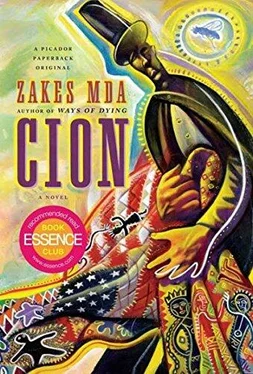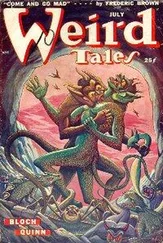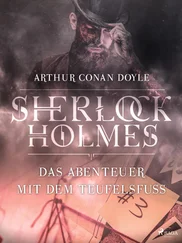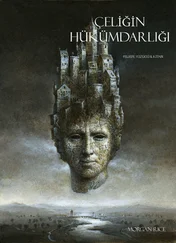The sciolist nagged me until he got tired: Toloki, you are a professional mourner. You have a vocation to fulfill. Do not be seduced by the life in Kilvert. We must see that you are here for a reason. We must see why you are a professional mourner and not just a man from South Africa who finds himself in a southeast Ohio hamlet . That voice has since gone silent.
Santa Claus walks out of the building and is about to take off his costume behind one of the SUVs when he sees me. I join him.
“Why would you strip naked in this cold?” I ask.
If he strips in the hall he will spoil the illusion for the kids.
“You think those kids are dumb? They know who you are.”
It is too cold, so he decides that he will take the costume off at home. The party is not over but his part is done. He would stay only if there was beer.
“I’ll walk with you,” I tell him.
We walk slowly past the little church. I am suddenly overwhelmed by an urge to mourn. My whole body cries for mourning. I tell Obed that I’ll find him at home. I need to go to the cemetery. He insists that he is coming with me. He has seen me mourn a few times and claims he finds the experience inspiring. But we don’t go into the cemetery. We walk toward the woods instead. We are drawn by the ghost tree gleaming among the maples and elms and walnuts. We tread lightly into the woods. Everything is still. Only our boots disturb the silence. I think Obed is warm enough in his Santa suit since it is stuffed with old clothes to give him a round figure. I am cold in my Windbreaker, which I am wearing over a light shirt that was never meant for such a chilly winter night.
It is dark in the woods but we are able to find our way with the aid of my penlight. We have no idea where we are going or why. The urge to mourn has dissipated, perhaps with the realization that I cannot mourn in civvies. I can only mourn effectively in my sacred costume. Something gleaming on the ground attracts my attention. It is a piece of porcelain. There is a mound covered by leaves and lots of debris. More broken pottery. We clear the leaves and discover a lamp chimney and a pot. We rummage some more in the leaves with our fingers. There is a white ceramic hen. There are seashells surrounding part of the mound. Clearly this is a grave.
“We must find the gravestone,” I tell Obed.
But it is too dark. We mark the spot with a cairn of stones so as to make it distinguishable in daylight. We walk back home, my heart pumping from the discovery. This is not just any grave. It is an African grave.
The next morning Obed and I return to the woods armed with a small digging spade, hoping that we did not just dream the grave. Today I am wearing my mourning costume, for I am going to mourn the African sleeping under that mound. Children titter along the way and ask Obed why I am wearing a Halloween costume when it is long past Halloween.
“It ain’t no Halloween costume, you little asshole,” says Obed. “My man here is an African shaman.”
“You don’t talk like that to children,” I admonish.
But the kids don’t seem to mind. They laugh and one of them asks: “What the fuck is an African shaman?”
He is not offended at all but promises to explain to them next time.
Well, the grave is still there. And this time we are able to find the headstone with ease. After scraping the mud from it the crude inscription becomes clear: Here lies Niall Quigley — Slave Owner, Slave Trader, Slave, Slave Stealer, Professional Witness. Died: 1875 .
“Who was Niall Quigley?” I ask.
“The first Quigley,” says Obed.
“I wonder why they buried him like an African.”
“What they wrote here is bull, man,” says Obed. “My great-grampa was no slave owner. He was no slave trader either. They got it all wrong, man. There were no slaves in Ohio.”
“We’ll know when we mourn the man,” I assure him.
We kneel at the mound and I teach him new mourning wails. They are like the sound of a coyote, he observes. I combine them with groans and moans and sacred chants of my own invention. Obed follows faithfully and together we are able to muster a two-part harmony at one time, and a call-and-response at another. Our mourning transports us to another place; another realm; another time.
The story is told by the mound and the white chicken and the headstone: Niall Quigley lost everything he owned in the gambling dens of County Tipperary, Ireland. After serving time at the Bridewell for some fraudulent transaction aimed at recouping his losses, he traveled steerage aboard a vessel to the new world where he hoped to start a new life. He endured the rough seas in crammed and filthy conditions. Some of his fellow passengers fell sick and perished, and were thrown overboard. He was determined to survive the voyage, and when his provisions ran out — passengers in steerage provided their own food — he stole from others. Even after a beating that left him all bloodied and tattered for most of the journey, the thought of the great fortunes awaiting him in America sustained him.
When we meet him for the first time in the gaming dens of New York he had not made the fortune, but like any decent white man he had a slave of his own. Ownership of this particular property was a source of great mirth at his haunts, not only because New York was no longer a slaveholding state, and hadn’t been one for fourteen or so years, but also for the fact that Quigley was a lowly Irishman. In the eyes of his fellow citizens he was not of a much higher breed than his property.
He won the property in a card game — a toothless scrawny African who would not fetch any price at the slave market in any of the slaveholding states. Even those who had offered to buy the slave before he became Quigley’s property had only done so for the good-Samaritan purpose of putting the poor creature out of its misery by shooting it dead at a target practice.
Quigley walked around the dirty streets of Five Points with his slave on a leash around his neck, and used him to beg as a “performing Negro.” But the fellow did not have any talent at all and people laughed at his attempts to sing and dance. His venture into some variation of tap dance was pathetic. Five Points citizens had seen better. After all, Five Points invented tap dance, although they didn’t call it that in those days. They called it “buck and wing” or the Juba Dance after the great “Master Juba” Lane whose nimble footwork of African rhythms combined so expertly with Irish clogging to create magic.
“What kinda Negro is this who can’t sing and dance?” people asked as they walked away, with their fingers trying in vain to stop the atrocious sounds from polluting their ears. The kinder souls put a coin or two in Quigley’s hat and fled to the bordellos in the tenements as fast as they could.
The partnership’s only bane was the band of ragamuffins who played cruel tricks on the performer and disrupted Quigley’s business. One day they set fire to the tattered seat of the slave’s pants for better entertainment than his performance was able to provide. He ran up and down the street screaming. At first Quigley enjoyed the sight and laughed. But when he realized that the pants had really caught fire and there were some flames he dived onto the fellow and rolled him on the ground. The ragamuffins ran off laughing.
That night in the church basement they shared with rats — courtesy of a kindly Methodist minister — Quigley took the leash off his slave and broke out laughing as he cleaned his scorched buttocks with cold water and lye soap that was never meant for human skin but for laundry.
“You son of a bitch!” said the slave. “You let them do this to me.”
Читать дальше












